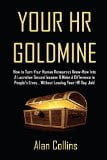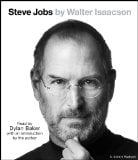Your HR Goldmine: How to Turn Your Human Resources Know-How Into a Lucrative Second Income & Make A Difference in People’s Lives…Without Leaving Your HR Day Job!
Frustrated by your HR day job, but can’t afford to quit? Discover how you can make more money on the side, create a profoundly more meaningful HR career for yourself…and become a powerful difference in other people’s lives. How? By simply sharing what you already know about Human Resources.
In this pull-no-punches, tell-all book, Alan Collins takes you by the hand and reveals step-by-step how to quickly and easily package, promote and cash in on your HR know-how and advice, without l
List Price: $ 27.00
Price: [wpramaprice asin=”0615546714″]
[wpramareviews asin=”0615546714″]
Steve Jobs
- Used Book in Good Condition
Based on more than forty interviews with Jobs conducted over two years—as well as interviews with more than a hundred family members, friends, adversaries, competitors, and colleagues—Walter Isaacson has written a riveting story of the roller-coaster life and searingly intense personality of a creative entrepreneur whose passion for perfection and ferocious drive revolutionized six industries: personal computers, animated movies, music, phones, tablet computing, and digital publishing. At a
List Price: $ 49.99
Price: [wpramaprice asin=”1442346272″]
[wpramareviews asin=”1442346272″]




Fantastic read – Highly recommended!,
0
Was this review helpful to you?

|Great book for entrepreneurs in the HR field!,
0
Was this review helpful to you?

|Allan is a difference maker. Read this book and make a difference in your career.,
Each one of us carries so much information that can make an impact in other people’s organizations, it is about time we all share this with others but also earn some income while doing so. Alan walks you through his system for monetizing information that would be valuable to others. You will discover that Alan reveals all his secrets to success behind all of this because you can tell he wants you to be successful like him!
Enjoy reading this book, let it inspire you, and make a difference in another HR person’s life -buy them a copy!
Mark A. Griffin, In HIS Name HR LLC
0
Was this review helpful to you?

|Gripping but amazingly incomplete,
The interviews with Jobs are fascinating and revealing. We get a real sense for what it must have been like to be Steve, or to work with him. That earns the book five stars despite its flaws, in that it’s definitely a must-read if you have any interest at all in the subject.
But there are places in the book where I have to say, “Huh?”
The book is written essentially as a series of stories about Steve. The book continuously held my interest, but some of the dramas of his life seem muted. For instance, he came close to going bust when both Next and Pixar were flailing. There was only the slightest hint that anything dramatic happened in those years. In one paragraph, Pixar is shown as nearly running him out of money. A few brief paragraphs later, Toy Story gets released and Jobs’ finances are saved for good.
We hear a lot about Tony Fadell’s role in the development of iPhone. Tony led the iPod group and was clearly a major source for the book. You may know from a recent Businessweek article that Tony was basically driven out of the company shortly after the final introduction of iPhone, due to personality conflicts between him and Scott Forestall, the person now in charge of iOS development. But the book doesn’t say a word about it. Tony simply disappears from the rest of the book with no explanation, and Forestall is barely mentioned.
Another strange incident was the Jackling house, the house he spent a large part of his life in. A case could be made that the house is historic simply because Steve spent many of his formative years living in it. Preservationists were battling with him to save the house. Only a couple of months before his death, when he must have known he was not going to actually build a house to replace it, he had the house torn down. I would have loved to learn this story. Why did he buy it? Why did he destroy it through neglect? Why did he acquire such a blind loathing for it that he worked hard to get it torn down?
And why did Jobs keep almost all the Pixar options to himself? He doesn’t seem to have needed the money, or even really wanted it that much. He could have cut his friends John Lasseter et al into their own huge fortunes. Lasseter only got about $25 million from Pixar, which seems like a shockingly low amount in view of his contributions. Now, it’s not like they will starve or anything, and I think John can buy pretty much anything he wants, but it still seems surprising Jobs is so ungenerous.
There were a lot of things like this, incidents casually tossed away in a brief paragraph that should have merited an entire chapter.
I think this will always be the best account of the emotional aspects of Steve’s life, which are fully covered. The chapters about his illness moved me to tears. But as an account of what really happened at Apple and how Steve fixed the company, it’s insufficient. I guess that will have to await more distance from the subject.
Of course what’s truly remarkable about Jobs is that he lived a life so full of incident that perhaps no biography has the space to cover the broad sweep of his life. He accomplished as much as 10 ordinarily famous men. Maybe the upshot is that you just can’t fit a man like this in a book, even if that book’s nearly 600 pages.
0
Was this review helpful to you?

|Story of the man who put a dent in the universe. Well worth reading.,
No other book on Jobs has been based on first hand information from the Master himself, his colleagues and his detractors. There is no other way to know the man who changed the way we live and work. The fact that the book is engaging is a big bonus.
First Jobs’ personal life, personality and beliefs. Like all fascinating people in history, Jobs was a bundle of contradictions. Born out of wedlock, he was an American icon and yet born of a Syrian Muslim whom he never knew, but had accidentally met. Adopted at birth by working class parents, he became skeptical of the Church as the all-knowing god did not help the starving children in Biafra and alternated between being a believer and a non-believer. He was, at different times, a vegan and a fruitarian (hence the name Apple). Jobs was influenced by the counter cultural ideas of the 60’s and the 70’s and yet become one of the most revered corporate figures of all time. He was a multi-billionaire who lived on a regular street with no high fenced compound, security or live-in servants; a Zen Buddhist who was obsessed with Zen-like simplicity but did not possess Zen-like tranquility; a son who tried to abandon his child like the way he had thought he was abandoned; a leader who was highly demanding of his colleagues and coworkers; a vastly influential figure in computing who neither built computers not wrote codes himself; a genius who was mean to many people. All these factoids had to have some influence on who he was and who he became and may keep interested psychologists busy for years. Yet, it is not for these tabloid fodder that he is looked upon with awe. To get caught up in the contradictions of a man is to miss the man.
So who is the man then? Isaacson presents Jobs life and work as a play in three acts.
During the first act, two unlikely partners named Steves (Jobs and Woz) create the world’s first commercially viable personal computer, Apple II. Jobs then creates the revolutionary but unsuccessful Lisa. Apple goes public, Jobs creates the Mac, which carves itself a distinct niche. He then brings in Pepsi’s Scully to manage the company only to find himself ousted from the company he founded. During his exile Jobs creates another revolutionary but not-so-successful computer NeXT. But Jobs other venture, Pixar, an outstanding animation company, is a huge commercial success.
The second act is Jobs’ return to Apple. Apple was in decline and it buys the money losing NeXT. Job returns to the company he founded as the interim CEO. Introduces a series of products: peppermint colored iMacs followed b y 21st Century Macs.
The third act is the post-pc revolution, the most dramatic of all: the creation of ipod (almost 10 years ago to the day), paradigm-changing iphone and the category-creating ipad, along with many other things and cloud computing. We can’t imagine a world today without ipads, ipods and iphones. The rewards are high. Apple first surpasses Microsoft and becomes the most valuable tech company. Then Apple becomes, for brief periods of time, the most valuable company in the world.
But this is not the story of Apple, but of Job. What was happening in the background while the three act play is being staged – to his family, his health, his odd beliefs that might have cost him his life, and his relationships with other giants of technology – is the focus of this book. The story is told with many interesting anecdotes such as Bill Gates incredulously exclaiming “Do ALL of you live here?” when visiting for the first time Steve Jobs’ modest house.
This is an “authorized biography” and I’m wary of “authorized” biographies. Always thought they were full-length PR pieces. This one is different. Jobs gave Isaacson complete freedom to write the book and Jobs didn’t demand editorial control. He didn’t even want to see the book before it was published. And it shows. You see Jobs as he was. Warts and all. This is Jobs’ last gift to those of us who admired his vision of the world, but wondered about the essence of the man behind it all. Now we know.
As you finish reading Job’s biography of nearly 600 pages, something strikes you as odd. Steve Jobs’ death is not mentioned in the book. Not the date, not the time and not even the fact that he is no more. Strangely fascinating. Like the man himself.
0
Was this review helpful to you?

|